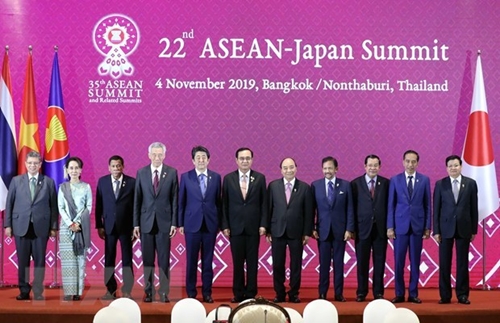He reviewed the positive results of joint efforts on across maritime security, anti-terrorism, the fight against trans-national crime, cyber security, national defence, non-proliferation and disarmament of nuclear weapons, and legal capacity enhancement.
In economic cooperation, Japan is the fourth largest trade partner, the second largest investor and the top supplier of official development assistance for ASEAN, he said.
The PM said he wished both sides would step up collaboration in protecting the marine environment, coping with natural disasters and climate change, preventing pollution, dealing with waste, providing health care for the elderly, developing clean energy and boosting sustainable development in the Mekong region.
    |
 |
|
Prime Minister Nguyen Xuan Phuc (fifth from right) at the 22nd ASEAN - Japan summit in Bangkok on Nov. 4 |
The leader welcomed the synergy between the Master Plan on ASEAN Connectivity 2025 and the Partnership for Quality Infrastructure, as well as cultural and people-to-people exchanges via the Japan – ASEAN Integration Fund.
On regional and global issues, he expressed ASEAN’s stance on issues regarding the East Sea and the Korean Peninsula.
ASEAN leaders agreed to boost the relationship with Japan and asked for enhanced coordination in infrastructure connectivity, smart city development, cyber security, anti-terrorism, post-disaster recovery, and narrowing the development gap.
Speaking highly of ASEAN’s important role, Japanese Prime Minister Shinzo Abe expressed his support for the ASEAN Outlook on the Indo-Pacific region, including its central role, and pledged to reinforce comprehensive cooperation with the bloc.
He urged countries to adopt the Joint Statement of the 22nd ASEAN – Japan Summit on Connectivity, and announced important cooperation initiatives, including enhancing financial support for ASEAN, holding training courses on cyber security, stepping up cooperation in smart city and infrastructure development, training a quality workforce; tapping opportunities arising from the Fourth Industrial Revolution, digital economy and innovation; response to climate change and plastic waste, cultural and people-to-people exchanges, and health care.
The Japanese PM stressed that ASEAN and Japan need to strengthen a free, open and fair multilateral trade system based on rules and welcomed progress in negotiations on the Regional Comprehensive Economic Partnership (RCEP).
Abe expressed his support for ASEAN’s stance on the East Sea, reaffirming the importance of maintaining peace, stability and security, maritime and aviation freedom and safety in the East Sea with respect to diplomatic and legal processes, while upholding the principles of international law, including the 1982 United Nations Convention on the Law of the Sea.
He called on parties concerned to exercise restraint, refrain from militarisation and unilateral actions that further complicate the situation, and make efforts to build an effective and practical Code of Conduct in the East Sea.
Concluding the meeting, the two sides adopted the Joint Statement of the 22nd ASEAN – Japan Summit on Connectivity.
Source: VNA